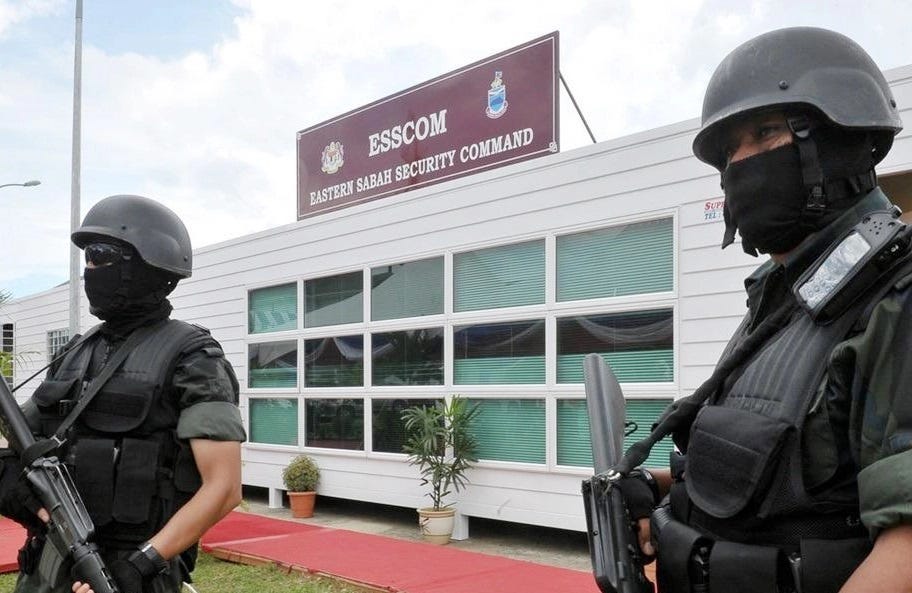Security in Malaysia's eastern Sabah better: Official
A night maritime curfew in the region has been relaxed.

SABAH: The move to rebrand the dusk-to-dawn curfew in eastern Sabah waters, to the Eastern Sabah Safety Zone (Esszone) Movement Control Order (MCO), and to reduce the areas placed under the list, shows that the level of security is getting stronger.
Eastern Sabah Security Command (Esscom) commander, Datuk Victor Sanjos, said that the move was important to give confidence, especially to the maritime community, tourists and investors, that the Esszone is safe to carry out any activity.
He said that the move also showed the efforts to improve the level of security in the Esszone.
Since the curfew was implemented, on 16 July 2014, it has had a positive effect in ensuring security, especially for the community in the area.
“I also believe that the media can play a role in creating confidence in stakeholders that the Esszone is safe to be visited, because it is rich in natural treasures. If tourists come in droves, of course, they will come back with investments.
“The Sabah government wants to turn the east coast into an investment area, especially in POIC (Palm Oil Industrial Cluster) Lahad Datu.
“I believe that this move will erode negative perceptions, especially in foreign countries. It is hoped that foreign countries will also remove the Esszone from the list of unsafe areas,” he said,
On Oct 16, Inspector-General of Police, Tan Sri Razarudin Husain, was reported to have said that the Home Ministry, the National Security Council and the Sabah Government agreed to rebrand the dusk-to-dawn curfew in eastern Sabah waters as the Eastern Sabah Safety Zone (Esszone) Movement Control Order (MCO).
Following the move, the Esszone MCO now only involves the waters of three nautical miles in the districts of Sandakan, Semporna, Kunak, Lahad Datu, Beluran and Kinabatangan, from 6 pm to 6 am, effective Oct 17.
The Esszone was introduced on March 25, 2013, after the Lahad Datu tragedy, and covers 10 districts, namely Kudat, Kota Marudu, Pitas, Beluran, Sandakan, Kinabatangan, Lahad Datu, Kunak, Semporna and Tawau.
Victor said that the move to remove Tawau from the list was based on the security guarantee which is getting stronger, so that there are no cases of kidnapping, as well as real threats and elements of militants or cross-border crimes such as the Abu Sayyaf Group (ASG).
“However, we must continue this effort (of maintaining security) by joining forces with the community, as well as domestic and foreign intelligence, to curb this activity (threats to security) and then we can study other areas and then remove them from the MCO,” he said.
Meanwhile, in TAWAU, the Kampung Batu Payung village head, Amat Salleh, said that the move was apt as the Tawau waters are not exposed to elements of invasion, except for the waters of Semporna, Sandakan, Kunak and Lahad Datu, located close to the waters of Sulu, which are perceived as ‘dangerous’.
“In Tawau, we are facing the problem of smuggling of illegal immigrants, but that has decreased since the curfew was implemented, so the waters of Tawau still require security patrols from Esscom, the Malaysian Armed Forces and the Malaysian Maritime Enforcement Agency,” he said.
He said that in his village as well as other villages, such as Kampung Tinagat and Kampung Membalua, the residents conduct security patrols every night, especially on the coast, involving the neighbourhood watch, the Voluntary Patrol Scheme (SRS) and members of the People Volunteers Corps (Rela).
Dwijaya Fisheries Sdn Bhd managing director, Naomi Cole, said that Tawau waters should be removed from the list, as there has never been a case of kidnapping for ransom (KFR), as such activity took place in the waters of Semporna to Tambisan and then Sandakan.
“I have a fishing boat in Semporna and, based on my experience, when my boat workers were kidnapped twice in KFR incidents in 2016 and 2018, I was traumatised. So the curfew should be continued in those areas,” she said.
The Felda Umas Fishing Village Association chairman, Abd Syukur Otoh, on the other hand, wants the security forces to continue intensifying control and patrols, even though the curfew in Tawau waters has ended, because things like the infiltration of foreign immigrants and smuggling need to be addressed without compromise.
“The issue of the arrival of illegal immigrants who profit from marine resources from the waters of Tawau also needs to be addressed, involving the cooperation of the enforcement of the Fisheries Department and the Royal Malaysia Police,” he said.
Meanwhile, in LAHAD DATU, Pulau Buta Eco Tourism entrepreneur, Jessica Reyes, said that the move was able to give a positive impression to tourists who want to visit the area, and is the right step to help its tourism industry.
“The curfew seems to give the impression to people outside the area that the area is very dangerous, but it is not. Sabah is safe to visit; our waters are always patrolled by the security forces, including by radar,” she said. — Daily Express


